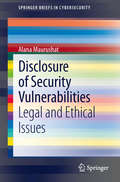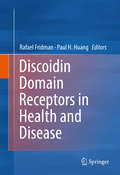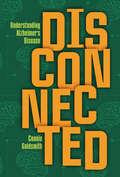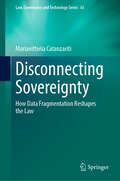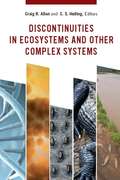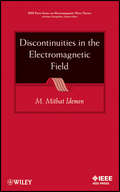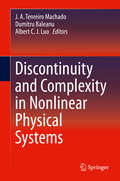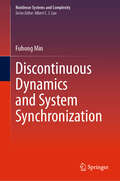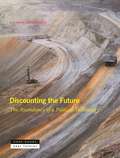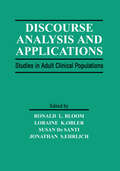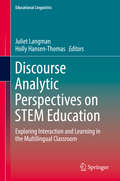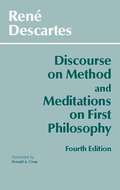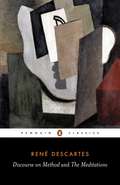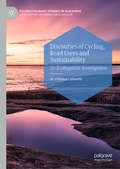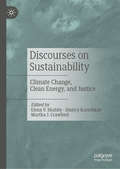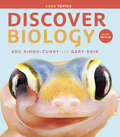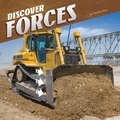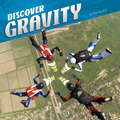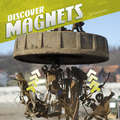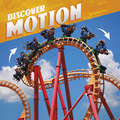- Table View
- List View
Disclosure of Security Vulnerabilities
by Alana MaurushatMuch debate has been given as to whether computer security is improved through the full disclosure of security vulnerabilities versus keeping the problems private and unspoken. Although there is still tension between those who feel strongly about the subject, a middle ground of responsible disclosure seems to have emerged. Unfortunately, just as we've moved into an era with more responsible disclosure, it would seem that a market has emerged for security vulnerabilities and zero day exploits. Disclosure of Security Vulnerabilities: Legal and Ethical Issues considers both the ethical and legal issues involved with the disclosure of vulnerabilities and explores the ways in which law might respond to these challenges.
Discoidin Domain Receptors in Health and Disease
by Rafael Fridman Paul H. HuangThe interactions of cells with their surrounding extracellular matrix (ECM) plays a pivotal role in driving normal cell behavior, from development to tissue differentiation and function. At the cellular level, organ homeostasis depends on a productive communication between cells and ECM, which eventually leads to the normal phenotypic repertoire that characterize each cell type in the organism. A failure to establish these normal interactions and to interpret the cues emanating from the ECM is one of the major causes in abnormal development and the pathogenesis of multiple diseases. To recognize and act upon the biophysical signals that are generated by the cross talk between cells and ECM, the cells developed specific receptors, among them a unique set of receptor tyrosine kinases (RTKs), known as the Discoidin Domain Receptors (DDRs). The DDRs are the only RTKs that specifically bind to and are activated by collagen, a major protein component of the ECM. Hence, the DDRs are part of the signaling networks that translate information from the ECM, and thus they are key regulators of cell-matrix interactions. Under physiological conditions, DDRs control cell and tissue homeostasis by acting on collagen sensors; transducing signals that regulate cell polarity, tissue morphogenesis, cell differentiation, and collagen deposition. DDRs play a key role in diseases that are characterized by dysfunction of the stromal component, which lead to abnormal collagen deposition and the resulting fibrotic response that disrupt normal organ function in disease of the cardiovascular system, lungs and kidneys, just to mention a few. In cancer, DDRs are hijacked by tumor and stromal cells to disrupt normal cell-collagen communication and initiate pro-oncogenic programs. Importantly, several cancer types exhibit DDR mutations, which are thought to alter receptor function, and contribute to cancer progression. Therefore, the strong causative association between altered RTK function and disease it is been translated today in the development of specific tyrosine kinase inhibitors targeting DDRs for various disease conditions. In spite of the accumulating evidence highlighting the importance of DDRs in health and diseases, there is still much to learn about these unique RTKs, as of today there is a lack in the medical literature of a book dedicated solely to DDRs. This is the first comprehensive volume dedicated to DDRs, which will fill a gap in the field and serve those interested in the scientific community to learn more about these important receptors in health and disease.
Disconnected: Understanding Alzheimer's Disease
by Connie Goldsmith“The common perception of Alzheimer’s from people who haven’t experienced it is that it’s more like a ‘quirk’ which all elderly people experience at some point. But Alzheimer’s is so much more than simple forgetfulness. With the memory loss comes confusion . . . What was once the bedroom turns into a frightening place . . . . They may not recognize family members and instead see them as strangers with unknown intentions. This gives them so much stress every day that they may lash out or become depressed.” —Charlie Poole, Alzheimer’s caregiver Alzheimer’s patients are one of the fastest-growing populations among aging communities in the United States. In 2024 roughly 6.9 million Americans aged sixty-five and older had Alzheimer’s disease. By 2050 that number is set to nearly double. An Alzheimer’s diagnosis affects more than just the patient—it impacts their family and friends too. As the disease progresses, the patient’s memory deteriorates, and their behavior may suddenly change. They may need more attention, care, and supervision. Many people are thrust into the role of a caregiver without preparation or knowledge of what's to come. In Disconnected: Understanding Alzheimer’s Disease, author and registered nurse Connie Goldsmith looks at the stages of Alzheimer’s, details current clinical research, and shares more than a dozen stories of patients and their families. No matter what age you are, it’s important to grow awareness for Alzheimer’s, recognize its signs and symptoms—and learn what you can do in the event that someone you love is diagnosed with the disease.
Disconnecting Sovereignty: How Data Fragmentation Reshapes the Law (Law, Governance and Technology Series #65)
by Mariavittoria CatanzaritiThis book explores the dynamic legal semantics of territory as applied to data. It offers a theoretical assessment of the legal challenges that data flows pose for the principle of territoriality and for state sovereignty more generally. The concept of sovereignty has traditionally developed in close connection with the exercise of powers over a territory, and ideas of jurisdiction have always been based on the principle of territoriality. Digitalization questions however the very idea of physical frontiers. Interconnected networks make data in effect borderless. Data can in fact be created, stored, processed, and accessed anytime and from anywhere. The idea of the book is upbeat: the law can keep pace with the ability of data to fragment reality. The condition for this is that sovereignty disconnects from territory. Disconnection is not getting rid of the territory once and for all, it only means that for data alternatives to the territorial connection exist. The analysis focuses on data from a holistic perspective (personal and nonpersonal) with the aim of investigating divergent and convergent solutions provided by different branches of the law (data protection, IP law, international law, and fundamental rights protection). It assesses in particular, the relationships between digitalization and the principle of territoriality, focusing on the specific legal aspects: the connections between law and territory; the impact of digitalization on state sovereignty; the use of extraterritoriality to circumvent territorial limitations on data flows; the rise of digital jurisdiction and its challenges; the interplay between digital jurisdiction and state sovereignty, and the alternative technological and legal solutions to data localization.
Discontinuities in Ecosystems and Other Complex Systems
by C. S. Holling Craig R. AllenA Major Contribution to Theoretical Ecology
Discontinuities in Ecosystems and Other Complex Systems (Complexity in Ecological Systems)
by C. S. Holling Craig R. Allen Eds.Following the publication of C. S. Holling's seminal work on the relationship between animal body mass patterns and scale-specific landscape structure, ecologists began to explore the theoretical and applied consequences of discontinuities in ecosystems and other complex systems. Are ecosystems and their components continuously distributed and do they adhere to scaling laws, or are they discontinuous and more complex than early models would have us believe? The resulting propositions over the structure of complex systems sparked an ongoing debate regarding the mechanisms generating discontinuities and the statistical methods used for their detection.This volume takes the view that ecosystems and other complex systems are inherently discontinuous and that such fields as ecology, economics, and urban studies greatly benefit from this paradigm shift. Contributors present evidence of the ubiquity of discontinuous distributions in ecological and social systems and how their analysis provides insight into complex phenomena. The book is divided into three sections. The first focuses on background material and contrasting views concerning the discontinuous organization of complex systems. The second discusses discontinuous patterns detected in a number of different systems and methods for detecting them, and the third touches on the potential significance of discontinuities in complex systems. Science is still dominated by a focus on power laws, but the contributors to this volume are convinced power laws often mask the interesting dynamics of systems and that those dynamics are best revealed by investigating deviations from assumed power law distributions.In 2008, a grand conference on resilience was held in Stockholm, hosting 600 participants from around the world. There are now three big centers established with resilience, the most recent one being the Stockholm Resilience Center, with others in Australia (an international coral reef center), Arizona State University's new sustainability center focusing on anthropology, and Canada's emerging social sciences and resilience center. Activity continues to flourish in Alaska, South Africa, and the Untied Kingdom, and a new center is forming in Uruguay.
Discontinuities in the electromagnetic field
by Idemen M. MithatA multifaceted approach to understanding, calculating, and managing electromagnetic discontinuities Presenting new, innovative approaches alongside basic results, this text helps readers better understand, calculate, and manage the discontinuities that occur within the electromagnetic field. Among the electromagnetic discontinuities explored in this volume are: Bounded jump discontinuities at the interfaces between two media or on the material sheets that model very thin layers Unbounded values at the edges of wedge-type structures Unbounded values at the tips of conical structures The text examines all the key issues related to the bodies that carry the interfaces, edges, or tips, whether these bodies are at rest or in motion with respect to an observer. In addition to its clear explanations, the text offers plenty of step-by-step examples to clarify complex theory and calculations. Moreover, readers are encouraged to fine-tune their skills and knowledge by solving the text's problem sets. Three fundamental, classical theories serve as the foundation for this text: distributions, confluence, and the special theory of relativity. The text sets forth the fundamentals of all three of these theories for readers who are not fully familiar with them. Moreover, the author demonstrates how to solve electromagnetic discontinuity problems by seamlessly combining all three theories into a single approach. With this text as their guide, readers can apply a unique philosophy and approach to the investigation and development of structures that have the potential to enhance the capabilities of electronics, antennas, microwaves, acoustics, medicine, and many more application areas.
Discontinuity and Complexity in Nonlinear Physical Systems
by Dumitru Baleanu J. A. Tenreiro Machado Albert C J LuoDiscontinuity in Nonlinear Physical Systems explores recent developments in experimental research in this broad field, organized in four distinct sections. Part I introduces the reader to the fractional dynamics and Lie group analysis for nonlinear partial differential equations. Part II covers chaos and complexity in nonlinear Hamiltonian systems, important to understand the resonance interactions in nonlinear dynamical systems, such as Tsunami waves and wildfire propagations; as well as Lev flights in chaotic trajectories, dynamical system synchronization and DNA information complexity analysis. Part III examines chaos and periodic motions in discontinuous dynamical systems, extensively present in a range of systems, including piecewise linear systems, vibro-impact systems and drilling systems in engineering. And in Part IV, engineering and financial nonlinearity are discussed. The mechanism of shock wave with saddle-node bifurcation and rotating disk stability will be presented, and the financial nonlinear models will be discussed.
Discontinuous Dynamics and System Synchronization (Nonlinear Systems and Complexity #39)
by Fuhong MinThis book provides a systematic introduction to the dynamical behaviors of discontinuous dynamical systems and system synchronization. The first part of the book presents the theory of flow switching in discontinuous dynamical systems as well as the switching dynamics in such discontinuous systems. The second part presents a theory for interaction discontinuities between distinct dynamical systems, from which partial and complete chaotic synchronizations in such systems are studied analytically and experimentally.
Discounting the Future: The Ascendancy of a Political Technology
by Liliana DoganovaA pioneering exploration of the defining traits and contradictions of our relationship to the future through the lens of discountingForest fires, droughts, and rising sea levels beg a nagging question: have we lost our capacity to act on the future? Liliana Doganova&’s book sheds new light on this anxious query. It argues that our relationship to the future has been trapped in the gears of a device called discounting. While its incidence remains little known, discounting has long been entrenched in market and policy practices, shaping the ways firms and governments look to the future and make decisions accordingly. Thus, a sociological account of discounting formulas has become urgent.Discounting means valuing things through the flows of costs and benefits that they are likely to generate in the future, with these future flows being literally dis-counted as they are translated in the present. How have we come to think of the future, and of valuation, in such terms? Building on original empirical research in the historical sociology of discounting, Doganova takes us to some of the sites and moments in which discounting took shape and gained momentum: valuation of European forests in the eighteenth and nineteenth centuries; economic theories devised in the early 1900s; debates over business strategies in the postwar era; investor-state disputes over the nationalization of natural resources; and drug development in the biopharmaceutical industry today. Weaving these threads together, the book pleads for an understanding of discounting as a political technology, and of the future as a contested domain.
Discourse Analysis and Applications: Studies in Adult Clinical Populations
by Ronald L. Bloom Loraine K. Obler Susan De Santi Jonathan S. EhrlichApplication of analytic discourse techniques to clinical practice is relatively recent. This book's contributors begin with the notion that systematic examination of discourse provides a rich source of data for describing the complex relationships among language, social context, and the cognitive processes that underlie discourse comprehension and production. Evidence is provided that when discourse is studied across different clinical populations, analysis yields an optimal opportunity for developing dynamic models of brain and language that more thoroughly account for the complexity of language use in social contexts. Accordingly, studies presented in this volume have a dual focus -- to examine the implications of discourse research on neurolinguistic theories and to evaluate the contribution of discourse analysis to understanding the clinical status of patients with brain damage. As such, this volume reports patterns of preserved and impaired discourse behavior in normal adults and in different adult clinical populations. It also describes numerous tasks designed to elicit a variety of discourse genres and a host of techniques created to describe how subjects order information and relate ideas across sentences. In addition, it includes numerous abstract units and linguistic devices targeted to examine those aspects of discourse that govern cohesion, organization, and topic manipulation. This volume is unique because it presents both theoretical and clinical papers that examine a variety of communication pathologies. Clinicians often report dissatisfaction with formal test batteries in that results are often at variance with clinical observation of performance in real life situations. To address this concern, this work proposes methods for examining discourse that move the examiner closer to naturalistic sampling. The research presented demonstrates that discourse analysis provides clinically significant information that contributes to the understanding of the cognitive, linguistic, and social status of people with communication disorders. These studies also offer a framework to support continuously evolving diagnostic and treatment paradigms for adults with neurological communication pathologies.
Discourse Analytic Perspectives on STEM Education
by Juliet Langman Holly Hansen-ThomasThis volume explores the nature of discourse in secondary and upper elementary mathematics and science classrooms. Chapters examine conditions that support or hinder teachers and students, in particular language learners, in employing language as a tool for learning. The volume provides rich oral and written language examples from a range of classroom contexts to illustrate how linguistic practices affect students' appropriation and display of disciplinary specific knowledge. Chapters further explore linguistic practices through with the support of discourse analytic models that foreground the authentic classroom data with the aim of understanding the dynamics of the classroom. The authors investigate the intersection between discourse and learning from a range of perspectives, including an examination of key concepts such as intertextuality, interaction, mediation, scaffolding, appropriation, and adaptations. This volume offers concrete suggestions on how teachers might benefit from a discourse approach to teaching in the areas of mathematics and science.
Discourse On Method and Related Writings
by René Descartes Desmond M. ClarkeDescartes' Discourse on Methodhas long been regarded as a seminal contribution to modern philosophy. We can now see that it is also one of the key texts in the 'scientific revolution' of the seventeenth century. Rene Descartes (1596-1650) did major research in optics, geometry, astronomy and physiology, although he published nothing until he was over forty. The Discourseforms the preface to his first collection of scientific papers (1637), sketching in a new method based on hypothesis and deduction which was soon to replace traditional techniques derived from Aristotle. This edition puts the work in context, by including extracts from Descartes' correspondence, the Rules for Guiding One's Intelligenceand from The World- a posthumously published summary of his physical theories. The age of Newton marks one of the great turning points in intellectual history; Descartes has a key place at its very heart. Also by Descartes is the companion volume, Meditations and other Metaphysical Writings.
Discourse on Method and Meditations on First Philosophy (4th Edition)
by René Descartes Donald A. CressThis new edition contains Donald Cress' completely revised translation of the Meditations (from the corrected Latin edition) and recent corrections to Discourse on Method, bringing this version even closer to Descartes' original....
Discourse on Method and Related Writings
by René DescartesThis is the second of a new two-volume edition of the works of Descartes in Penguin Classics. This volume is designed for students who approach Descartes from the point of view of his philosophy of science. Includes DISCOURSE ON METHOD, the most accessible and well-known of his discussions of scientific method; the first seven chapters of the earlier, unpublished work, THE WORLD; as well as a selection of Descartes' correspondence and his replies to his critics.
Discourse on Method and the Meditations: And Meditations On The First Philosophy (Barnes And Noble Library Of Essential Reading Ser.)
by René DescartesRené Descartes was a central figure in the scientific revolution of the seventeenth century. In his Discourse on Method he outlined the contrast between mathematics and experimental sciences, and the extent to which each one can achieve certainty. Drawing on his own work in geometry, optics, astronomy and physiology, Descartes developed the hypothetical method that characterizes modern science, and this soon came to replace the traditional techniques derived from Aristotle. Many of Descartes' most radical ideas - such as the disparity between our perceptions and the realities that cause them - have been highly influential in the development of modern philosophy.
Discourses of Cycling, Road Users and Sustainability: An Ecolinguistic Investigation (Postdisciplinary Studies in Discourse)
by M. Cristina CaimottoThis book employs a Critical Discourse Studies (CDS) framework to examine cycling mobility, marking a new turn in ecolinguistic discourse analysis. The author focuses specifically on environment-related arguments concerning the promotion of higher levels of cycling, mainly as a means of transport, and investigates the “US vs. “THEM” narratives present in many discourses about road users. Analysing newspaper articles, institutional documents and spoken interviews, the author searches for a positive new discourse that would inspire and encourage cycling as a habitual means of transport, rather than simply exposing ecologically destructive discourse. The book will be of interest to discourse and ecolingusitics scholars, as well as contributing to the lively debate about how to increase cycling in fields such as sustainability, sociology, transport planning and management.
Discourses on Sustainability: Climate Change, Clean Energy, and Justice
by Martha J. Crawford Elena V. Shabliy Dmitry KurochkinThis volume presents an in-depth analysis of climate change problems and discusses the proliferation of renewable energy worldwide—in conjunction with such important questions as social justice and economic growth, providing an interdisciplinary approach to sustainable development. Exploring various responses to human-induced climate change, the book offers a critical reflection on climate change and clean energy and highlights the fundamental problems of international energy justice and human rights. Examining these and other climate-related issues from legal, business, political, and scientific perspectives, the volume also analyzes the impact of economic factors and policies on climate change mitigation and adaptation.
Discover Biology (Sixth Edition)
by Anu Singh-Cundy Gary ShinDiscover Biology facilitates the active learning of science in and out of class. It advocates for "Scientific literacy through active learning. before, in and after class." ,,, for this to be achieved, students must retain the core concepts learnt in class.
Discover Forces (Discover Physical Science)
by Tammy EnzHow do you get something to move? You use force to move it with a push or a pull. With this basic introduction to forces, young readers will learn about physical forces and how they are at work in our world every day.
Discover Gravity (Discover Physical Science)
by Tammy EnzWhat would happen if gravity didn't exist? People and objects would float into space! With this basic introduction to gravity, young readers will discover how gravity works and how it affects everything in our world and beyond.
Discover Magnets (Discover Physical Science)
by Tammy EnzWhat would our world be like without magnets? Computers, radios, phones, and TVs wouldn't work correctly. And many other modern machines wouldn't exist. With this basic introduction to magnets, young readers will learn how magnets work and how useful they are our world today.
Discover Motion (Discover Physical Science)
by Tammy EnzTake a look out the window. What do you see? People, cars, bikes, birds, and more are all on the move. With this basic introduction to motion, young readers will discover the three laws of motion, what they mean, and how they affect our lives every day.
